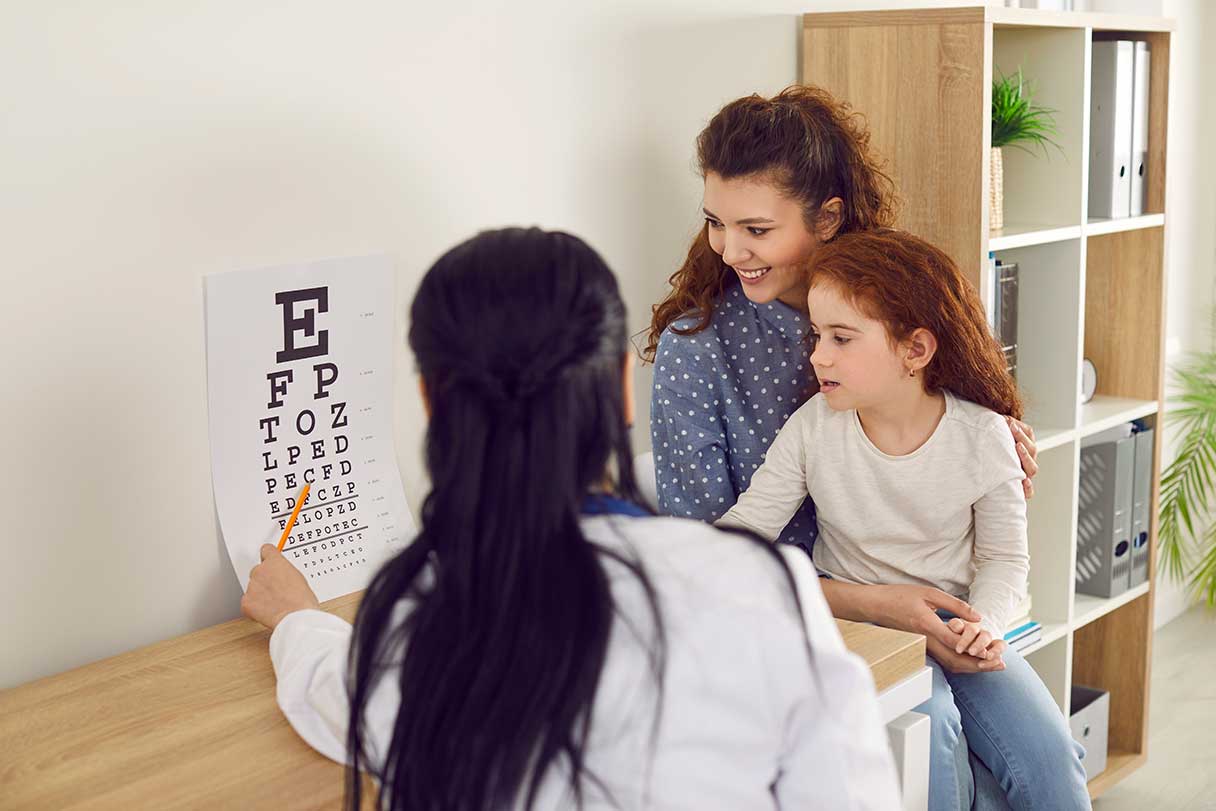Blue light naturally occurs in sunlight, along with other colors on the spectrum. There are also indoor sources of blue light that include computer screens, smartphones, tablets, fluorescent and LED lights and flat-screen TVs. Blue light from digital devices isn't a cause for concern by itself, but prolonged exposure may affect sleep, contribute to eyestrain and possibly have longer-term effects.1
What Are Blue Light Glasses?
Blue-light-filtering glasses, or “blue light glasses," use specially coated lenses to filter out a percentage of blue light emitted from sources like computers, smartphones, tablets, TVs and artificial lighting. Individuals who spend significant time with screens may use them to relieve eye discomfort or strain and reduce sleep disruptions.2
Why Are Blue Light Glasses Important?
According to one study, 80% of American adults use digital devices for more than two hours per day, and nearly 67% use two or more devices at the same time. Fifty-nine percent have symptoms of digital eyestrain.1
Screen usage is also high among children and adolescents. According to the American Academy of Pediatrics, children spend an average of seven hours per day on screens.5
Current research hasn't supported the idea that prolonged exposure to blue light from screens and other digital devices may cause retinal damage or lead to other eye problems like macular degeneration.4 Although some screen users may experience computer vision syndrome (CVS) or digital eyestrain, characterized by watery or dry eyes, blurred vision, headaches or neck and shoulder pain, these symptoms are generally attributed to an overuse of screens in daily life rather than exposure to blue light.7
Too much exposure to artificial blue light late in the day or at night can disrupt sleep patterns, and exposure to any type of blue light can act as a signal to the brain that it's appropriate to be awake, making it difficult to settle into sleep or stay asleep.8 If you spend a lot of time in front of screens throughout the day and evening, some research has shown that wearing blue light glasses may help with improved sleep quality and quantity.9
Read Related Articles
12 Tips to Protect Your Vision and Keep Your Eyes Healthy
15 Tips to Help Prevent Digital Eye Strain
How Do Blue Light Glasses Work?
Blue light glasses have filters in their lenses that either absorb or reflect blue light, preventing it from reaching your eyes. This can help reduce exposure to sleep-disrupting blue light waves after dark.3
Blue light glasses with a red or orange tint typically block a wider spectrum and larger percentage of blue light, but can also distort colors on the screen you're viewing. Clear or yellow-tinted glasses reflect a narrower range of blue light and may be a good option for daytime use.10
Benefits of Blue Light Glasses
Evidence for the benefits of blue light glasses is mixed.2 And there isn't a consensus in the medical community as to their effectiveness.1 Some studies suggest that blue light glasses may help lessen eyestrain, while other studies have not shown blue light glasses to have a significant effect on sleep patterns or to help with symptoms of eyestrain.2 Overall, more research is needed to confirm the benefits of blue light glasses.6
While blue light glasses may not help improve symptoms of eyestrain or fatigue, most health care providers agree that wearing them will not cause harm.7 Some potential benefits of blue light glasses may include:
- Reduced eyestrain. Blue light may contribute to eyestrain after prolonged screen exposure. Wearing blue light glasses may help reduce eyestrain by filtering out blue light.1
- Improved sleep quality. Blue light can disrupt your circadian rhythm, which is your body's natural sleep-wake cycle. Wearing blue light glasses in the evening can help improve sleep quality by protecting your natural melatonin production, which signals the body that it's time to sleep.3
- Protection against eye damage. Blue light glasses may help to protect against long-term eye damage, although more conclusive research is needed. According to the American Academy of Ophthalmology, artificial blue light from electronic devices won't cause retinal damage or macular degeneration. However, overexposure to natural blue light and UV rays from the sun could lead to some eye diseases.4
If you're considering buying blue light glasses, it is important to talk to your doctor or eye doctor first. They can help you determine if blue light glasses can help your specific situation.
How Much Do Blue Light Glasses Cost?
Blue-light-blocking glasses are available as glasses used exclusively to block blue light, as over-the-counter (OTC) reading glasses or glasses in prescription form.2
OTC blue light glasses and blue light reading glasses are commonly available at drugstores, online or through an optical shop, and can range in price from $13 to $60.2 Prescription blue light glasses ordered through an optometrist or ophthalmologist can range in price from $120 to more than $200, depending on the type of lenses, frames and brand.2
If you need prescription blue light glasses, some health insurance plans may cover part of the cost.2
How to Choose the Right Pair of Blue Light Glasses
Visiting an optometrist or ophthalmologist is recommended to ensure you're getting a quality product, particularly if you have a preexisting eye condition, or wear prescription glasses or contact lenses.9
Consider your needs when purchasing blue light glasses. Are you a heavy screen user and intend to wear blue light glasses most of the day? Or will you wear blue light glasses occasionally or only at night? If you intend to wear blue light glasses outside, it's a good idea to make sure the lenses include UV protection as well.2 Size, fit and comfort are important factors in finding the right pair of blue light glasses for your needs.10
Additionally, evaluate the type of lens that's right for you. Darker-tinted lenses (amber, orange or orange-red) can be highly effective at absorbing blue light, but may affect the way you perceive colors and may not be desirable for all-day wear. Clear or lightly tinted yellow lenses typically block less blue light but may be more user-friendly for all-day use.10
Check the retailer's return policy for any blue light blocking glasses,10 especially those with a higher price tag. Some retailers allow for a trial period, others may charge a restocking fee and some may not allow returns on custom glasses. Work with your eye doctor to make sure you're choosing blue light glasses that are the right fit and function for you.
Are Blue Light Glasses Worth It?
While blue light glasses are not a cure-all for sleep problems or digital eyestrain, most health care professionals agree that if you experience benefits from wearing blue light glasses, such as improved sleep hygiene, there's no harm in wearing them regularly.9 With a relatively low price point for nonprescription lenses, blue light glasses can be an affordable option to test and see if they're right for you.
In addition, you can reduce digital eyestrain with frequent screen breaks throughout the day and refraining from blue-light emitting screens one to two hours before bedtime.4
If eyestrain and sleep disruption is a serious concern, talk with your doctor about other options or treatments.
Financing Eyewear With the CareCredit Credit Card
Whether you're purchasing stylish new frames, getting contacts, or due for an eye exam, the CareCredit credit card can help you pay for care where your insurance leaves off.* Use our Acceptance Locator to find a vision specialist near you that accepts CareCredit so you can see all that life has to offer. Continue your wellness journey by downloading the CareCredit Mobile App to manage your account, find a provider on the go and easily access the Well U blog for more great articles, podcasts and videos.
In addition to vision care, you can also use your CareCredit credit card for dentistry, cosmetic, pet care, hearing, health systems, dermatology, pharmacy purchases, spa treatments and so much more within the CareCredit network. How will you invest in your health and wellness next?
Author Bio
Anne-Marie Kennedy is a freelance writer with more than 20 years of experience covering health and wellness, personal finance and real estate/investing.







